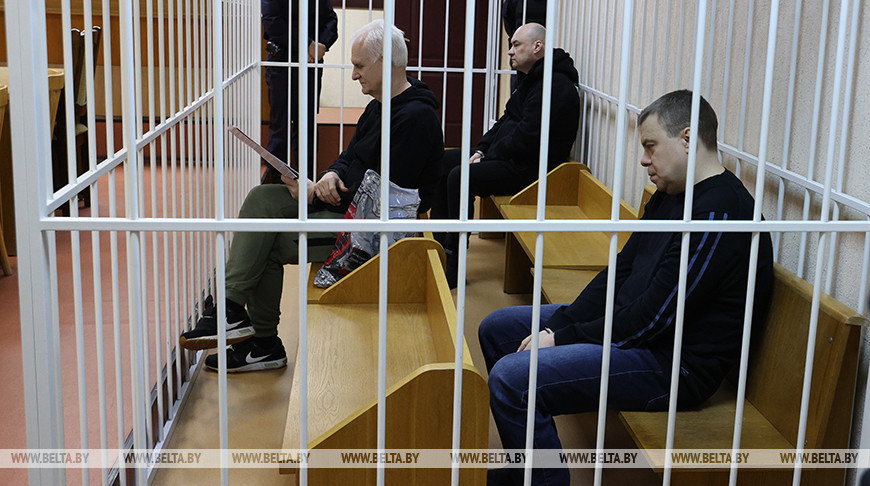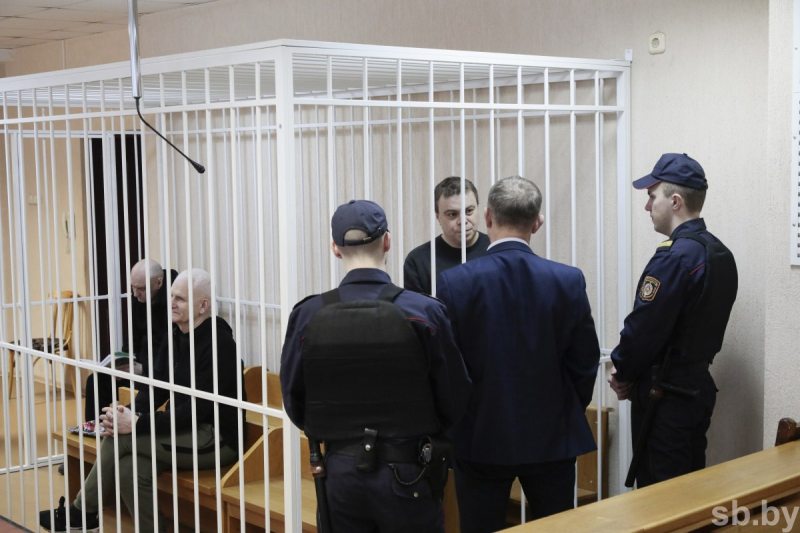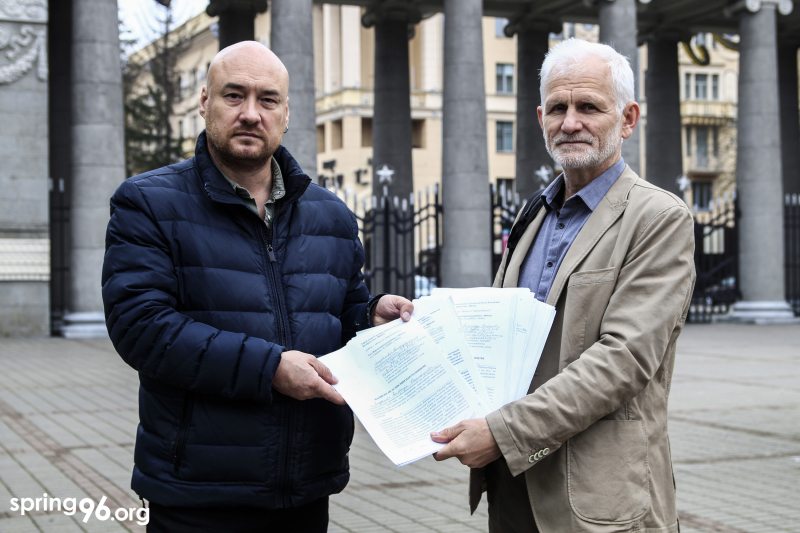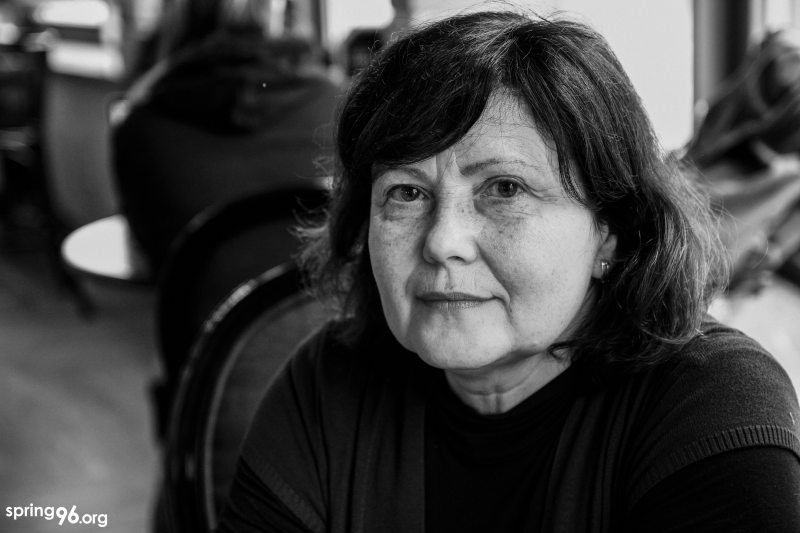Wiretap recordings, a list of political prisoners, and materials from Viasna website: what's inside Viasna case file
The stage of introducing the written materials is coming to an end in the Viasna trial. Soon the court will start hearing the defendants. Viasna tells what constitutes the prosecution evidence and human rights defender Alena Masliukova comments on what is really targeted in these proceedings.

Viasna members on trial: A day-by-day chronology of the court
According to the case files, between May 2020 and July 14, 2021, the defendants purposefully prepared citizens to participate in group actions that grossly violate public order. In addition, under the guise of human rights and charity activities, including on behalf of Viasna and the unregistered foundation BY_HELP, they financed such actions and provided other material support, the prosecution believes.
In particular, human rights defenders are accused of:
- paying fines for persons convicted of “administrative offenses against the public order and the public administration” and “other offenses related to protesting against the actions of public bodies”
- reimbursing expenses for paying fines to such persons
- paying bills for meals in places of administrative detention instead of some persons “who have committed the named administrative offenses”
- paying lawyers, including those who provided defense in criminal cases “associated with a gross violation of the public order and protesting against the actions of public bodies”.
As proof of this, the prosecution presents, among other things, the correspondence of human rights defenders. But they themselves claim that the Human Rights Center Viasna did not provide direct assistance in compensating fines and paying bills—it was in the domain of BY_HELP initiative.

The case file contains many articles from organization’s webpage spring96.org and publications from Viasna social networks, including those that mention the BY_HELP initiative. The prosecutor noted that the information resources of the Human Rights Center contain a lot of information on how to behave during interrogations, arrests, searches, in court, what to do if one was beaten by police officers, as well as a lot of information on election observation. He also highlighted a post from the Viasna Volunteer Service Telegram channel that volunteers to monitor trials are wanted.
The case file also contains information from the Viasna website about the arrest of human rights defenders on 14 July 2021, and Human Rights Center’s statement: “We will not stop our human rights activities”. Statement by Human Rights Center Viasna.
“There are photo-images, which also show Stefanovic, Labkovich, Bialiatski, and Salauyou. There are publications about the judges of the Republic of Belarus, where the number of days of imprisonment and fines imposed by them is calculated,” says prosecutor Aliaksandr Karol.
At the trial, a lot of articles about the activities of Viasna was read out. All of them are publicly available on organization’s social networks and on the website spring96.org.
“I don't quite understand why to read out all of these? These are all public human rights activities,” Stefanovic noted.
Judge Zapasnik admonished him and told him not to disturb the order.
At the trial, the prosecutor noted that the case file contains a list of political prisoners recognized by Viasna as of September 3, 2022 (1,322 people), shortly before the final charges against human rights defenders were filed. It should be noted that it is the human rights community of Belarus not just one organization that recognizes political prisoners, which can be seen in every statement of human rights defenders.
The materials concerning the activities of human rights defenders Marfa Rabkova and Leanid Sudalenka, volunteers Andrei Chapiuk and Tatsiana Lasitsa, and other human rights activists, were read at the trial. Thus, the case file has January 2021 wiretap reports of Uladzimir Tseliapun from Mazyr.

- Valiantsin Stefanovic and Ales Bialiatski with sureties for Marfa Rabkova, October 2020. Photo: spring96.org
It also became known at the trial that Leanid Sudalenka’s phone was tapped by the Main Directorate for Combating Organized Crime and Corruption (GUBOPiK) officers. A significant part of the case materials concerns the criminal case of already convicted Leanid Sudalenka and Tatsiana Lasitsa. There is Sudalenka’s correspondence with dozens of people, including his messages to UN Special Rapporteur Anaïs Marin, and videos with people who say that their fines were paid by BY_HELP. The prosecution referred to the sentence of Homieĺ human rights defenders, which came into force. Leanid Sudalenka was detained on January 18, 2021. He was sentenced to three years in jail under Part 2 of Article 342 of the Criminal Code.
Hundreds of victims' names arrested in administrative proceedings under Article 23.34 of the Code of Administrative Offensese (participation in unauthorized mass events) and Article 24.3 of the Code of Administrative Offenses (disobedience to police officers) are read at the trial. According to the investigation, all of them had received assistance from Viasna. The verdicts of Leanid Sudalenka, Tatsiana Lasitsa, Marfa Rabkova, and Andrei Chapiuk are also evidence of this count in the Viasna case.
A considerable part of the case file consists of documents seized in the office of Viasna Homieĺ branch. It is interesting that despite the trial of Homieĺ human rights defenders was closed to public, now, in the open court, the materials of that case could be heard by spectators.
Human rights defender: “No activity aimed at promoting and protecting human rights in a non-violent way can be criminalized at all”
Human rights defender Alena Masliukova comments on the charges against her fellows:
“The authorities began to apply the article on financing protests, under which our colleague Leanid Sudalenka had already been convicted earlier, only in May 2020.
According to the Investigative Committee, people took to the streets only because it was backed by human rights defenders who had publicly stated that the victims of repression would receive the necessary assistance. However, the logic of the accusation against the Viasna human rights defenders does not make a causal connection, since help was provided to those subjected to human rights violations only after a citizen was exposed to the repressive machinery. No activity aimed at promoting and protecting human rights in a non-violent way can be criminalized at all.
The prosecution repeatedly refers to the sentence against Leanid Sudalenka and Tatsiana Lasitsa, which came into force. Since the Viasna case involves the convicted human rights defenders from Homieĺ, the issue preclusion applies. In fact, under such conditions there is no point in trying to prove the innocence of Bialiatski, Stefanovic, and Labkovich under the article on protest financing (part 2 of Article 342 of the Criminal Code). I am sure that this situation undermines my colleagues' right to defense and, as a consequence, indicates a violation of the standard of a fair trial.
The sentencing of our colleagues will take place after denunciation by Belarus of the Optional Protocol to the Covenant on Civil and Political Rights. This means that there will be no possibility for my colleagues to submit individual communications to the UN Human Rights Committee. Accordingly, they will not be able to exercise their right to appeal to international bodies to protect their rights, which is provided by Article 61 of the Constitution.
It is important to consider the Viasna case in the sociopolitical context that has prevailed in Belarus since August 2020, rather than in the financial and economic context, as the authorities are trying to present it through the propaganda media. It is human rights activities that are the subject of prosecution—not the movement of funds across the state border by an organized group, not the financing of protests, and certainly not self-interest. Our colleagues are being tried for defending the rights and freedoms of Belarusians caught between the desire for peaceful change and democratic alternation of power and the brutal response of the state in the form of mass repression of its citizens.”


















